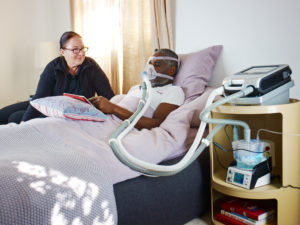Noninvasive ventilation therapy, such as that provided by CPAP machines, could offer care for critically ill COVID-19 patients who aren’t yet in need of ventilators, according to a series of white papers and published evidence from China and Italy.
Now, an association representing makers of such devices has said their use could lessen the burden on hospitals finding themselves short of the more invasive devices.
“This could be a game changer in the race to get as many ventilators in the hospitals as we possibly can,” said Scott Whitaker, president and CEO of AdvaMed. “A large majority of COVID patients could benefit from these respiratory devices, easing pressure on our critical care system in hospitals and offering another lifesaving option for tens of thousands of people suffering from respiratory problems.”
The Centers for Disease Control and Prevention has said COVID-19 patients who don’t require hospitalization but need oxygen supplementation could possibly get it through noninvasive ventilation, whereby air is delivered through a mask or mouthpiece.
Easy Breathe, the most popular online CPAP store, said it continues to maintain a complete inventory of products, including CPAPs, BiPAPs/BiLevels and other necessary supplies.
“For Easy Breathe, it is our highest priority to ensure that CPAP users continue to get the products they need during the COVID-19 outbreak,” said CEO and founder Nick Weiss. “For that reason, we have ordered and received extra inventory of our most popular products.” The site can deliver CPAP products in as little as one business day.
In a late March statement on COVID-19 treatment options, the Food and Drug Administration recommended “other alternatives [to ventilators] that should be considered such as devices for treating sleep apnea. A George Washington University professor suggested CPAPs could act as “life-saving, stop-gap” ventilators.
A new survey by AdvaMed found that ventilator manufacturers could produce an average of 60,000 noninvasive devices weekly by the middle of the second quarter. That would be an increase from approximately 14,000 weekly as of early April.

But it’s also important to note that some CPAP makers, such as ResMed, have shifted their focus away from manufacturing those machines in order to ramp up ventilator production.
“There is an increasing amount of clinical guidance coming out of China, Europe, and the U.S. that positions non-invasive ventilation and invasive ventilation as appropriate, along the spectrum of patient presentation and care,” said ResMed Chief Medical Officer Carlos M. Nunez, MD, said in a AdvaMed press release. “These limited numbers of invasive ventilators can be reserved for the most severe cases by using non-invasive devices to care for those with less acute respiratory symptoms and findings.”
Hillrom President and CEO John Groetelaars said his company is increasing production of noninvasive options.
“This form of respiratory therapy is ideal for treating patients with mild to moderate respiratory distress across various acute care settings, including the emergency department, med-surg and post-ventilator weaning support,” he said.



